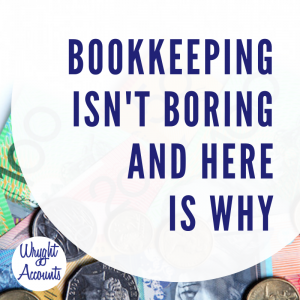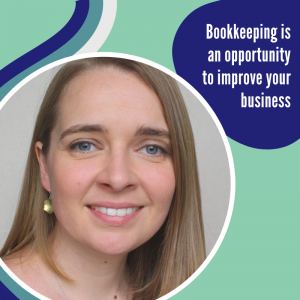I think the reason people think bookkeeping is boring is because they approach it with the attitude that’s it’s a bit pointless and basically just data entry. But bookkeeping isn’t boring!
Admittedly many bookkeeping tasks are data entry. Categorising your expenses. Creating invoices for sales that have already been agreed upon. Entering income earned on other platforms that has already been deposited in your account. Matching transactions that occurred in a bank statement to those recorded in the software.
BUT that data isn’t the be-all and end-all of bookkeeping. And thinking of it as such overlooks a huge opportunity.
Opportunities
Each transaction is an opportunity to learn about your business and to reflect, review and refine.
- Categorising your latest PayPal purchase to equipment becomes a reflection on if that $12.99 microphone was a good investment?
- Reviewing your expenses for the month becomes a reminder of have you used those website templates you purchased?
- Entering your income from Udemy for the month and comparing it to how many hours you spent on Q&A becomes is this a good investment of my time question.
- Entering a transaction reminds you it was also charged to your credit card last month but you paid for the annual subscription…maybe there’s a duplicate charge?
The answer to each of these questions is an opportunity to improve and refine your business. And it’s not ALWAYS about saving money. How long did you spend searching for the cheapest microphone and is it actually any good or did you end up having to purchase a better microphone and spend about 45 minutes on finding the best price to save $5.
Yes, there are probably expenses that aren’t giving you the best value and regularly reviewing those purchases can save you money. But equally how long will setting-up an alternative booking platform take to save you $3.50 per month? Over the course of a year, you’ll save $42. But if it takes 45 minutes to change it and update all your links then that time was valued at about $56 an hour.
Long Term
The second aspect that many people miss when it comes to finance is knowing your numbers on a longer-term basis. Reviewing the numbers both individually and on aggregate. Looking for patterns. And being curious about causes and effects impacting your money.
- Do you see an increase in revenue at a particular point or time in the year?
- Is that increase in revenue quickly followed by an uncanny increase in expenses? Is that good for business or your bottom line?
- Looking at a monthly profit and loss becomes reviewing your purchases patterns to spot that a large income quickly translates into more expenses.
- Looking at your expenses by suppliers can highlight that you fall into FOMO when a favourite company, coach or brand email you a special offer? Have you used those purchases? Are they providing value?
- If you’re investing are you seeing a return on the cost, time or effort? FB ads paying you back or increasing your customer service and refunds rate? Mindset coaching resulting in more VIP clients?
Bookkeeping Isn’t Boring
Getting to know your business numbers really can help your business grow.
- Addressing those unnecessary expenses
- Anticipating quieter periods and proactively brainstorming how to increase them or how to utilise them for rest, holidays and working on the business
- Knowing when your big expenses are likely to occur during the year and planning your cash flow accordingly
How can you get to know your numbers a little better this week and this month?
- If your data is up to date go run a monthly profit and loss for two years and see if you can spot any patterns.
- If your data isn’t up to date join my free training on Wednesday 24th March and we’ll make a plan to catch up in less than an hour a week. Sign up now and let’s make it quicker and easier.
Watch the Video
Pin for Later


